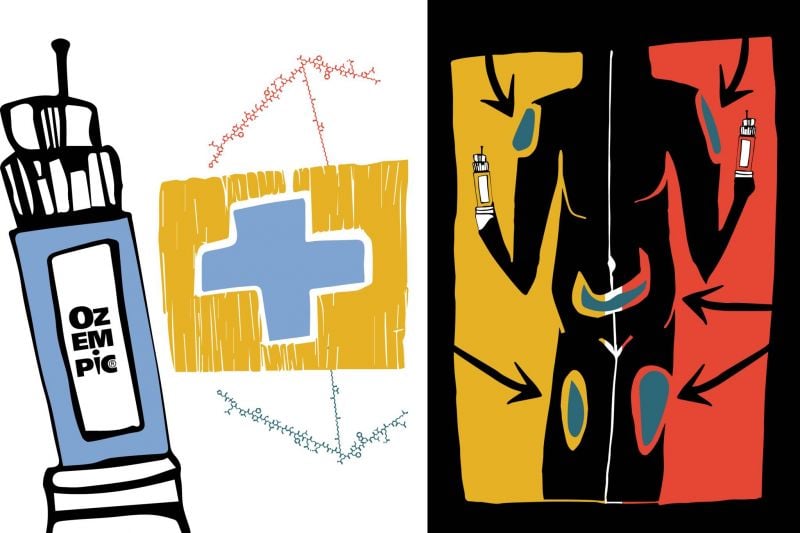
Illustration by Jaimee Haddad.
Illustrations by Jaimee Haddad
Type 2 diabetes drug Ozempic is seemingly everywhere in Lebanon and in the world. People use it as a quick fix for weight loss. But it’s not without consequences.
For our special series on Ozempic — the first to investigate the drug’s impacts in Lebanon — L’Orient Today delves into the narrative surrounding the injection.
Here are the answers to the most common questions about Ozempic in Lebanon.
 Illustration by Jaimee Haddad.
Illustration by Jaimee Haddad.
What is Ozempic?
Ozempic is a diabetes drug now also used for weight loss.
Ozempic is the Danish pharmaceutical company Novo Nordisk’s trade name for semaglutide, a once-weekly injectable that works by lowering someone’s appetite and slowing down their digestive system.
It was approved by the US Food and Drug Administration (FDA) in 2017 for type 2 diabetes, but not for losing weight. It’s not approved for weight loss in Lebanon, either.
Originally landing on the Lebanese market in 2019, the injectable Ozempic pens are now wildly popular for quick weight loss.
 Illustration by Jaimee Haddad.
Illustration by Jaimee Haddad.
An oral, pill version of semaglutide is also now available on the Lebanese market under the trade name Rybelsus, though only in very limited quantities, according to Samira Nasreddine, a pharmacist and pharmaceutical representative in Beirut.
How does it work for weight loss?
“Humans have two main hormones that are responsible for hunger and satiety,” that is, the feeling of being “full,” according to cell and molecular biologist Johnny Nakhleh.
One of the functions of semaglutide, the active ingredient of Ozempic, is to suppress ghrelin, the hunger hormone, leading to prolonged periods of satiety.
Ozempic “also delays gastric emptying, prompting the stomach to take more time to send everything to the intestines,” explains Stephanie Baddour, a clinical dietitian and co-founder of the educational platform Dietitics Institute for Continuous Education (DICE).
 Illustration by Jaimee Haddad.
Illustration by Jaimee Haddad.
When gastric emptying slows down, people feel “supersatiated,” Baddour explains — and therefore less hungry. It is that specific side effect that led people to start using Ozempic for non-diabetic purposes, en masse.
Is it approved for weight loss?
Ozempic is not approved for weight loss in Lebanon, according to Rita Karam, director of the Health Ministry’s Quality Assurance of Pharmaceutical Products Program. It should only be used by people with type 2 diabetes.
Most scientific studies to date suggest that Ozempic does aid in weight loss — but not necessarily in the long term.
Nakhleh cites a 2022 study, in which participants who took Ozempic for 68 weeks experienced an average weight loss of 17.3 percent, equating to approximately 21 kg for someone weighing 120 kg. These individuals did not suffer from diabetes but had a BMI of over 30.
However, those participants regained approximately two-thirds of their initial weight loss one year following the withdrawal of Ozempic.
 Illustration by Jaimee Haddad.
Illustration by Jaimee Haddad.
It is worth noting that Novo Nordisk released another injectable medication, Wegovy, made with semaglutide, which is approved the FDA for weight management in people with a body mass index of 27.
Wegovy is not legally available in Lebanon, as it is not listed on the Health Ministry’s national drug database.
What are the side effects?
Ozempic is not risk-free.
“You will never find a drug with zero side effects, no matter how small. Some of the recorded side effects of using Ozempic are gastrointestinal issues, such as diarrhea, vomiting, constipation and abdominal cramps,” Nakhleh says.
The drug can also cause hypotension (low blood pressure), and hypoglycemia (low blood sugar) and carries potential dangers of thyroid cancer in patients already at risk for the disease, according to Baddour.
How much does it cost?
The short answer: it depends.
The government’s official price is LL10,267,775 — about $115 at the market exchange rate — per one-month box of injections.
When L’Orient Today visited seven pharmacies around its office in Hazmieh in February, only two had the drug in stock and were selling it at the government’s official price, with pharmaceutical sales company Mersaco stickers indicating the drug had been sourced legally.
 Illustration by Jaimee Haddad.
Illustration by Jaimee Haddad.
Months ago, Mersaco stopped supplying Ozempic to Lebanon’s market, meaning most of today’s Ozempic users are likely buying it from the black market, where prices are higher.
One pharmacist in Metn, who offered to sell an undercover L’Orient Today reporter Ozempic without a prescription, said a one-month box of injections imported informally from France would cost $180.
How widespread is Ozempic in Lebanon?
There are few — if any — statistics yet available on the spread of Ozempic in Lebanon, according to Karam and Pharmacists’ Syndicate President Joe Salloum.
This is partly due to the drug’s popularity on the black market, brought into Lebanon by pharmacists and everyday people from foreign countries in their luggage.
Does Lebanon have a high rate of obesity?
Kind of. But Lebanon definitely has an anti-fatness and diet culture problem, too.
According to a 2023 WHO report, Lebanon saw a significant increase in “obese” adults (from 24.6 percent to 32 percent) between 2000 and 2016. Among children, that number rose from 9.4 percent in 2000 to 13.9 percent in 2016. A 2016 study published in the World Journal of Cardiovascular Diseases named television and lack of nutritional knowledge as major factors for the shift.
These numbers are based on the subjects’ BMI measurements, which many experts say is not enough to determine if someone is overweight or not, as it does not distinguish between excess fat, muscle or bone mass.
These numbers, though high, don’t tell the whole story. There is also a predominant social pressure to look thin.
A 2021 study of 90 Lebanese women found that “messages that women receive from the media, family, and peers are often intended to promote the female thin ideal, and these messages may contribute to the development of eating disorders.”
The study did not include men or gender non-conforming people.
According to a 2016 study published in the World Journal of Cardiovascular Diseases, 23 percent of the Lebanese population would opt for medication for weight loss.